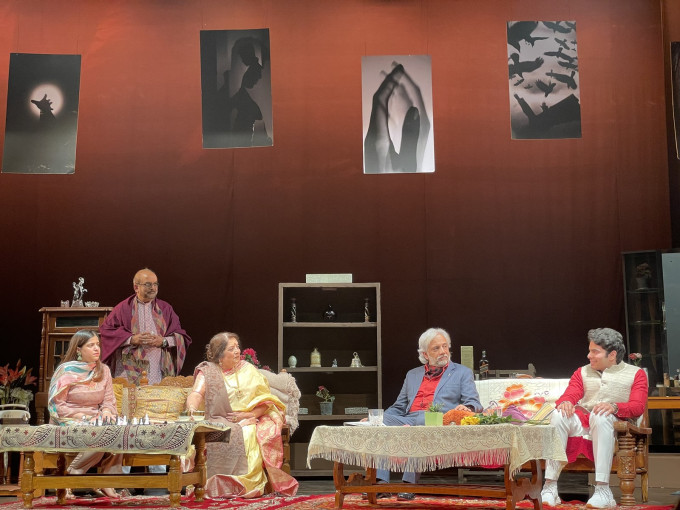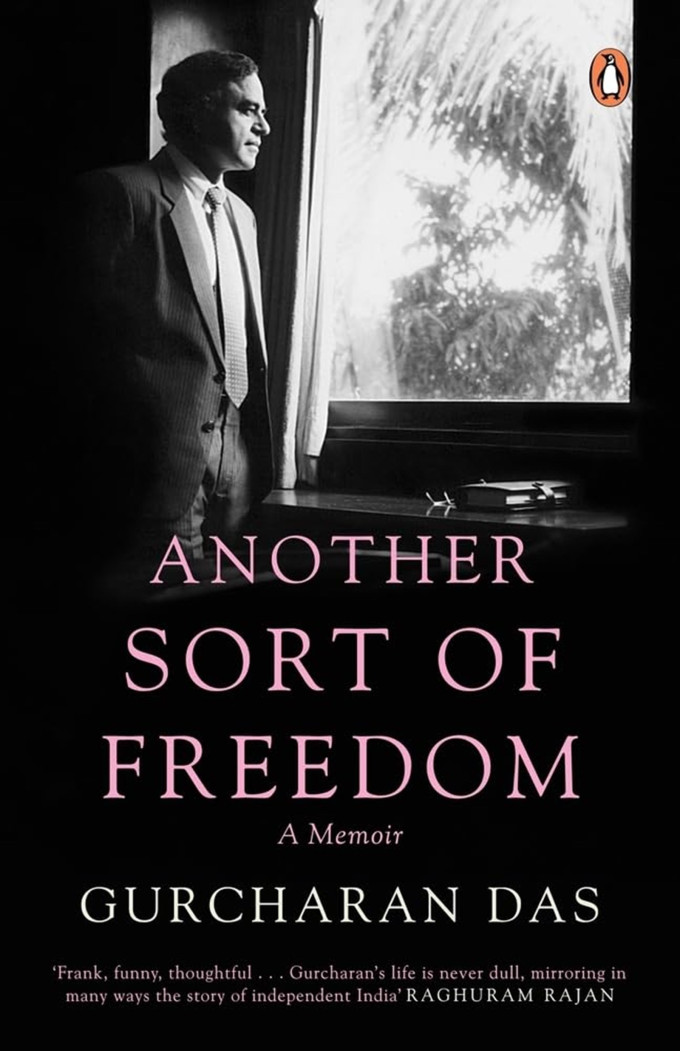‘Writing a memoir is a bit like playing God with your own life story’: Gurcharan Das
An old play in a new light — ‘9 Jakhoo Hill’ — directed by Gouri Nilakantan Mehta has brought the story, originally penned by Gurcharan Das, once again before the audience. Das, who served as the CEO of P&G India, before turning to a full-time career in writing, calls the latest iteration of his play a fresh departure from the previous renditions.
Mehta, who runs the Platform for Action in Creative Theatre, aims to bring back classic plays into modern light through her initiative. She believes that “growth of a country cannot exist without cultural capital” — which requires promoting theatre and artists.

In a video interview with indianexpress.com, Das talked about his inspiration for ‘9 Jakhoo Hill’, writing a memoir ‘Another Sort of Freedom’, his writing process, tips for penning a memoir, and more. Excerpts:
Q: How did ‘9 Jakhoo Hill’ come to be?
Gurcharan Das: The writing of ‘9 Jakhoo Hill’ began in my twenties while I was in a job. While my corporate colleagues indulged in golf outings, I found my solace in crafting stories over the weekends. It all started with a bold decision at the age of 22, when I imagined myself writing a play like Shakespeare might have penned ‘Hamlet’.
Prior to ‘9 Jakhoo Hill’, I had success with two historical plays — Larins Sahib and another based on Mirabai (‘Mira’). However, ‘9 Jakhoo Hill’ marked a departure as it addressed contemporary societal shifts.
The play’s narrative is deeply rooted in the shifting social landscape of India, particularly during the 1962 Indo-China war. It explores themes of changing social orders, familial dynamics and the clash between tradition and progress. Set against the backdrop of the evolving Indian identity, ‘9 Jakhoo Hill’ captures the zeitgeist of a changing era.
Surprisingly, despite its historical setting, ‘9 Jakhoo Hill’ struck a chord with audiences in the 1990s (when it was first performed), mirroring the societal changes of that time. Ultimately, it became a reflection of the human experience — navigating change, confronting the past and embracing the future. Amidst its poignant themes of nostalgia and disillusionment, there’s a glimmer of hope — a reminder that even amidst adversity, there’s room for resilience and renewal.
 ‘9 Jakhoo Hill’ directed by Gouri Nilakantan Mehta. (Credit: Saumya Rastogi)
‘9 Jakhoo Hill’ directed by Gouri Nilakantan Mehta. (Credit: Saumya Rastogi)
Q: You have also written a memoir named ‘Another Sort of Freedom’. What inspired the book’s title?
Gurcharan Das: The title of my book is deeply rooted in the ancient Indian concept of Purushartha, which encompassed four fundamental aims of life — Artha, Dharma, Kama, and Moksha — each representing a facet of human potentiality, guiding individuals towards a flourishing existence.
‘Another Sort of Freedom’, as the culmination of this quartet of books, focuses on Moksha, which is often understood in religious or spiritual contexts as liberation from the cycle of rebirth. However, I interpret it in a contemporary sense, emphasising the idea of freedom from the expectations and demands that surround us.
The idea of freedom, as I’ve come to understand it, is intricately tied to a state of self-forgetting. Let me illustrate with a personal anecdote. Just recently, I found myself so engrossed in writing a particular section of my book that I completely lost track of time. It’s akin to what athletes refer to as being “in the zone”. Sachin Tendulkar famously described a similar experience during his career, where the bat seemed to swing effortlessly as if guided by some unseen force.
In that moment of creative immersion, the ego fades away, leaving behind a sense of pure focus and connection. It’s a state where one’s actions flow effortlessly, almost instinctively, without the interference of conscious thought. This, to me, is the essence of freedom — the ability to transcend the limitations of the self and tap into a deeper, more intuitive realm of existence.
Reflecting on my transition from the corporate world to writing, I had hoped that this newfound freedom would lead to personal growth and enlightenment. However, what I’ve come to realise is that the world of business, despite its complexities, fosters a greater sense of interconnectedness and empathy.
Unlike writers who often work in solitude, businesspeople rely on a network of relationships to thrive. They understand the importance of treating customers, suppliers and employees with respect and fairness, recognising that their success is intertwined with the well-being of others.
In contrast, as a writer, I’ve often found myself isolated, absorbed in my own thoughts and creations. While this solitude can be conducive to creativity, it also breeds a sense of detachment from the world around me. It’s a solitary pursuit that, at times, lacks the sense of community and collaboration inherent in business endeavours.
So, while writing has granted me a certain degree of freedom and autonomy, it has also highlighted the importance of human connection and interdependence. It’s a valuable lesson that I continue to grapple with as I navigate the dual worlds of creativity and commerce.
 ‘Another Sort of Freedom: A Memoir’ by Gurcharan Das. (Source: Amazon.in)
‘Another Sort of Freedom: A Memoir’ by Gurcharan Das. (Source: Amazon.in)
Q: What tips do you have for those planning to write memoirs?
Gurcharan Das: Writing a memoir is a bit like playing God with your own life story. You have the power to choose which moments to immortalise on the page; but it’s a delicate balance between portraying yourself as flawless or flawed.
In my experience, reliving your life through the lens of memory can be even more fulfilling than living it in real-time. There’s a certain satisfaction in connecting the dots of your past — piecing together the puzzle of your existence in a way that makes sense to you.
Memoir is not just a chronological retelling of events — it’s a curated selection of moments that shaped who you are. It’s about delving into the themes and threads that run through your life, portraying the essence of your being.
So, my advice to aspiring memoirists is simple: be authentic. Embrace the good and the bad, the triumphs and the failures, and trust that the story you tell will resonate with others because of its honesty and humanity. After all, life is messy and imperfect, and that’s what makes it beautiful.
Q: What made you transition from having a corporate life to becoming a full-time writer at the age of 50?
Gurcharan Das: The transition to becoming a full-time writer at the age of 50 was not a sudden leap but rather the culmination of a lifetime shaped by two influential forces: my mother’s pragmatism and my father’s spiritual perspective.
From a young age, I grappled with the tension between making a living and making a life, a dichotomy epitomised by my parents’ contrasting outlooks. While my mother emphasised the importance of practicality and financial security, my father urged me to pursue my passions and find fulfillment beyond material success.
This internal struggle persisted throughout my academic and professional pursuits. Despite pressure to pursue a stable career in engineering, I found myself drawn to the humanities and embarked on a journey of intellectual exploration at Harvard. But it was during a pivotal moment in my 40s, while serving as CEO of a prominent company, that I felt the weight of existential restlessness.
The winds of change were blowing in India, and I sensed a calling to contribute to the nation’s transformative journey. Witnessing the uncertain fate of economic reforms, I heeded the call to action and returned to India with a mission to advocate for change.
Stepping away from the corporate world into the realm of writing was not without its risks. Yet, fuelled by a desire to make a meaningful impact and armed with the confidence gained from previous literary endeavours, I took the plunge. With a column in a leading newspaper and a passion for articulating the significance of economic reforms, I embarked on a new chapter of my life as a writer and advocate for change.
The transition was not just about leaving one career behind; it was about embracing a different way of life — a life driven by purpose, passion, and a commitment to shaping the narrative of India’s future. And in doing so, I discovered a freedom that transcended the confines of corporate success — a freedom to pursue a path aligned with my truest aspirations and convictions.
Q: In an interview, you mentioned that nonfiction writing has been your calling even though you started with fiction. Why has it been your favourite genre?
Gurcharan Das: I believe fiction demands pure imagination, a gift of a vast imagination. However, I’ve always felt more at ease with facts, with the tangible, with what I could learn and comprehend.
Each of my books has been a journey of self-cultivation, delving into new subjects that troubled me deeply. Poverty in India troubled me, and ‘India Unbound’ was my response. Corruption was another concern, leading me to explore the intricacies of morality and dharma in the Mahabharata. Similarly, the enigma of desire intrigued me, and I penned ‘The Difficulty of Being Good’.
Every book carried with it a driven agenda, a quest to understand and address pressing issues. Drawing from my background in fiction, I discovered that my writing took on a more literary quality — a style appreciated by readers and editors alike. ‘India Unbound’ marked a pivotal moment where I found my voice, a voice that echoed my natural speech, a pivotal milestone for any writer.
Q: What does your writing process look like? And how do you think it has evolved over time?
Gurcharan Das: Well, my writing process has certainly undergone a transformation over the course of my career. It all began during my days as a part-time writer, juggling writing with the demands of a weekday job. I quickly realised that if I truly wanted to excel at something, I needed to dedicate myself to it wholeheartedly. Thus, what started as a weekend hobby soon became a full-fledged occupation.
I established a routine where Saturdays and Sundays were dedicated solely to writing. My family understood that I would be unavailable in the mornings, joining them only for lunch before we engaged in activities together. Despite the irony of imposing a rigid timetable on what is often perceived as a creative pursuit, I found that this structure was instrumental in maintaining focus and productivity.
This routine served me well, providing a welcome escape from the stresses of the workweek and vice versa. However, as I transitioned to full-time writing, the routine itself remained largely unchanged. What evolved over time was my confidence in my abilities.
With each passing day, I honed my craft, rewriting paragraphs multiple times to perfection. Practice, as they say, makes perfect, and I found that my writing improved with every iteration.
In particular, this memoir reflects a departure from my previous works in terms of style and tone. Embracing the theme of ‘laghima’ — lightness — I deliberately chose to infuse the narrative with humour and levity. Despite grappling with philosophical concepts, I endeavoured to make the text accessible and enjoyable to readers of all ages, from young enthusiasts to seasoned readers.
 ‘9 Jakhoo Hill’ showcased at the Shri Ram Centre, Delhi. (Credit: Saumya Rastogi)
‘9 Jakhoo Hill’ showcased at the Shri Ram Centre, Delhi. (Credit: Saumya Rastogi)
Q: What are your thoughts on the latest iteration of your play ‘9 Jakhoo Hill’?
Gurcharan Das: I’ve been advocating for something quite simple: authenticity in speech. Just as I strive to write as I speak, I believe that actors on stage today in India should feel comfortable speaking the way we naturally converse in our everyday lives. And what characterises our speech in most languages is a delightful blend of our mother tongue and English.
So, my first piece of advice to her (Gouri Nilakantan Mehta) wasn’t to stick to pure Hindi or Hindustani. Instead, I encouraged her to embrace Hinglish, a dynamic fusion of languages. ‘Aaj middle east mein peace ho gayi’, as the headline on a news channel proclaimed, captures this beautifully — four words of English seamlessly interwoven with three Hindi words. This is the essence of the language spoken in our homes, on our streets, and in our hearts.
I can’t predict with certainty what language we’ll be speaking in India a hundred years from now. However, considering that English and Hindi are currently the two fastest-growing languages in the country, it’s likely that the linguistic landscape will continue to evolve towards a rich amalgamation.
Languages, after all, evolve naturally over time. Just look at the history of English — originating from the bustling markets of medieval England, it eventually emerged as a global lingua franca. Similarly, I envision the language of Gouri’s play to reflect the vibrant tapestry of India’s bazaars — a language that may very well become the unofficial lingua franca of India in the future.
Q: What is your advice to aspiring writers?
Gurcharan Das: My advice to writers is simple: write as you speak. And remember the timeless wisdom from Strunk and White’s ‘Elements of Style.’ This little book, a bestseller among writers worldwide for over 50 years, emphasises the importance of using the active voice in your writing, not the passive voice.
Establish a routine for yourself. Don’t wait for inspiration to strike; if you’re serious about your craft, you must commit to it every day. Consider the habits of famous writers like Somerset Maugham, who would don a formal suit before retiring to his study for a day of writing. While my approach may be more casual — pajamas and a kurta — it’s about creating a mindset of professionalism and respect for your work.
As Woody Allen famously said, “80% of success is showing up”. So, make it a point to show up at your desk every day, ready to pour your thoughts onto the page. That consistency and dedication are key to honing your craft and achieving success as a writer.
Disclaimer: The copyright of this article belongs to the original author. Reposting this article is solely for the purpose of information dissemination and does not constitute any investment advice. If there is any infringement, please contact us immediately. We will make corrections or deletions as necessary. Thank you.





